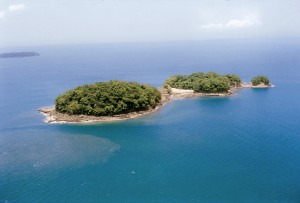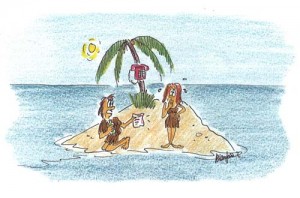Most property owners know that adverse possession can present a risk to ownership rights. But you might be surprised to know that even private islands aren’t immune to the threat of squatters…
Most property owners are aware that adverse possession can present a serious risk to ownership rights. Yet it might come as a surprise to find out that even private islands aren’t immune to the threat of squatters, with Vladi Private Islands’ Farhad Vladi revealing three separate occasions in which island owners have regrettably lost their islands. And as reports filter in that yet another privately-held island could be at risk of falling into the hands of trespassers, Private Island News presents a timely reminder of how best to protect your property. Know your ownership rights!
What are “squatter’s rights”?
Squatter’s rights – or, as it’s known in legal circles, adverse possession – refers to when a person makes an ownership claim for a piece of land despite not owning the property’s legal title document. A person can acquire squatter’s rights by being in sole exclusive occupation of the property for a certain period of time.
The specifics differ from country to country. In the UK and Ireland, where there have been several prominent adverse possession claims, this period is 12 years; in popular private island destination Nova Scotia however, claims must reach as far back as 20 years. It’s a different story all together in much of Central and South America, however. In Costa Rica, for example, squatters – or precaristas – begin to receive rights to a piece of real estate after 3 months of living on the land and can apply for expropriation after just one year. It is therefore extremely important to read up on the local laws and regulations.
It’s not enough to set sail for a private island and sit out the necessary amount of time though. According to Nova Scotia’s Department of Resources: “To gain ownership of land by squatting or adverse possession, you must use and occupy the lands in a way that clearly shows that you believe that you own the land.” Typically, the owner must have lost the right to the land or property either by being dispossessed or by having discontinued possession of the land, and there must be continuous and physical occupation by the squatter.
Additional criteria, such as grazing animals without paying rent, putting up fences or maintaining the land, combined with a failure by the owner to reject the trespasser’s claim are further factors typically considered by a court of law when assessing individual adverse possession cases. A trespasser’s activities on the land must furthermore demonstrate that he or she believes that the land is theirs and that the person with the deed has no right to the land.
How to protect your private island from the threat of squatters
When it comes to private island trespassers and squatters, prevention is the best form of defense. Before signing the contract on your island, be sure to carry out a thorough inspection of the property to make sure that there are no squatters already hiding away on the island and make sure there are no tenant with legal rights to remain. A full legal inspection of all elements pertaining to your future ownership could save you a lot of trouble and expense in the long run.
After taking on the ownership of an island, it’s important to be err on the side of caution when working with third parties and to remain vigilant at all times. If ever you decide to let out your part of your land to a third party, be sure to do so via a binding, written contract which clearly lays out the terms (and, most importantly, the duration) of your agreement. A regular site inspection is another invaluable step in the fight against squatters – as this excellent article by the Irish Independent points out, even slight acts of ownership by the true owner of the property can be enough to negate an adverse possession claim. Private Island News recommends visiting your island at every three to five years.

Isla de Coco, Panama – Image courtesy of Vladi Private Islands and used for illustration purposes only
It’s also worthwhile making sure that your property taxes are always paid on time. In Panama, for example, organized syndicates have been known to search out island properties that aren’t up to date on their taxes as easy pickings for an adverse possession claim. After paying off the arrears and assuming the taxes, these organized syndicates are free to take over the island and make an ownership challenge. It is – or, at least, can be – as simple as that.
Further steps to take involve maintaining the upkeep of your island. An unattended, unsupervised island is a beacon for squatters. If you aren’t able to get to your island abode as often as you would like, consider whether it might not be worthwhile employing an island caretaker to keep an eye on your island kingdom and keep any unwanted invaders and intruders away from it.
Finally, Private Island News cannot emphasize enough the importance of working with a reputable real estate agency. In less politically stable regions such as Central America, it is not uncommon to hear of corrupt brokers who, after selling an island, immediately engage a team of paid squatters to occupy recently purchased properties. In a mere matter of months, you may find that the island is no longer yours and that your new investment is now worth nothing.
Would-be island buyers should always work together with reputable real estate agents such as Vladi Private Islands. As well as being members of the International Real Estate Federation, FIABCI, they offer a wealth of experience about everything from brokerage, property management, market evaluations, island tourism and everything in between. No-one knows islands quite like the Vladi team.
Adverse Possession Worldwide: Laws at a Glance
Australia
The times vary according to circumstance. The basic period to take court action for trespass is 12 years for private land. If a private owner or occupier fails to make a complaint to the courts within 12 years, they are no longer able to seek the courts assistance to evict the trespasser. Longer periods apply if the victim is subject to some disability such as mental incapacity or for a number of other possible reasons is unable to respond. The period for Government land 20 years.
http://tlaw.com.au/wp-content/uploads/2012/01/Adverse-Possession-Booklet1.pdf
Bahamas
If a person squats on your land for twelve years (12) and develops your land without your knowledge and he or she lays claim through the courts, then his / her claim is published in the local newspaper for six weeks, and if the rightful owner is not made aware of this the squatter become the new owner through the courts.
Source: http://www.hannaian.com/realty/news.html
Belize
Belize has a tough anti-squatting laws unlike other Central American countries. One can only claim title to a land or easement upon proof to the Supreme Court of Belize that one has had continuous and undisturbed possession for 30 years on National and Conveyed lands and 12 years on registered lands.
Source: http://www.arebb.com/belize-real-estate
British Virgin Islands
Squatting however is not common in the British Virgin Islands or Anguilla. It is worthwhile to note that both these countries are still foreign territories of the UK. The UK Land Registration Act applies throughout these territories. Please see our information about the UK for further details.
Source: http://www.fig.net/news/news_2013/ladm2013/25.pdf
Canada
If you are claiming to own land that belongs to the province, you must have total control of the land and you must be able to show that you or others who used and occupied the land before you have been on the land for a total period of 40 years without any breaks in time. If you are claiming land owned by a private individual, you need to show 20 years of continuous use and occupation.
Source: http://novascotia.ca/natr/land/adverse-possession.asp
Costa Rica
In North America, squatters have considerably less rights than in Central America, for example. In Costa Rica, if a squatter sits on your land for three months unimpeded, they can start to establish a claim.
Source: http://www.howtobuyaprivateisland.com/private-island-pests.htm
France
In France, the main situation in which rights over land can be obtained merely through use as though you were the owner is called prescription acquisitive and it comes into play after 30 years of uninterrupted use with no complaint from a former owner. This right has to be formalised by a judge.
Source: http://www.connexionfrance.com/property-land-rights-squatters-france-10657-news-article.html
Ireland
The Statute of Limitations stipulates a period of 12 years for the bringing of an action by the owner for recovery of land from a squatter, or 30 years where the land is owned by the state. Thus if a squatter enjoys adverse and exclusive possession of land for 12 years which is inconsistent with the title of the true owner, the title of that property owner is said to be extinguished. This is reduced to six years where the property is the estate of a deceased person.
New Zealand
Under section 3 of the Land Transfer Amendment Act 1963, an adverse possession application can be made by an occupier of land who can show that they have had at least 20 years of ‘continuous exclusive possession’ without the registered proprietor’s consent
Source: http://www.lawlink.co.nz/articles.php?articleid=163
Panama
The general law in Panama has been that one who occupies and improves a piece of land and treats it in every way as his or her own without respect to any other person’s or institution’s claim, and persists in this claim for 15 years, becomes the owner of that land by squatter’s rights.
Source: http://www.thepanamanews.com/pn/v_19/issue_02/editorial.html
UK
The 2002 Land Registration Act the old rules still apply for unregistered land introduced a new regime. Someone claiming adverse possession, and who had not had 12 years of occupation by October 13, 2003, has to apply to the Land Registry after 10 years. The owner has 65 business days to object the notice will be sent to the address at the Land Registry, so keep it up to date.
USA
In the United States, squatting laws vary from state to state and city to city. In Maine, for example, A party claiming title by adverse possession has the burden of proving, by a preponderance of the evidence, that possession and use of the property was: actual; open; visible; notorious; hostile; under a claim of right; continuous; exclusive; and for a duration exceeding the 20-year limitations period
Further Reading
A Legal Definition of Adverse Possession by Cornell University
http://www.law.cornell.edu/wex/adverse_possession
Adverse Possession: When Trespassers Become Property Owners by NOLO Law for All
http://www.nolo.com/legal-encyclopedia/adverse-possession-trespassers-become-owners-46934.html
The Legal Maze of Squatters’ Rights Laid Bare by The Irish Independent
http://www.independent.ie/business/farming/the-legal-maze-of-squatters-rights-laid-bare-26872250.html



